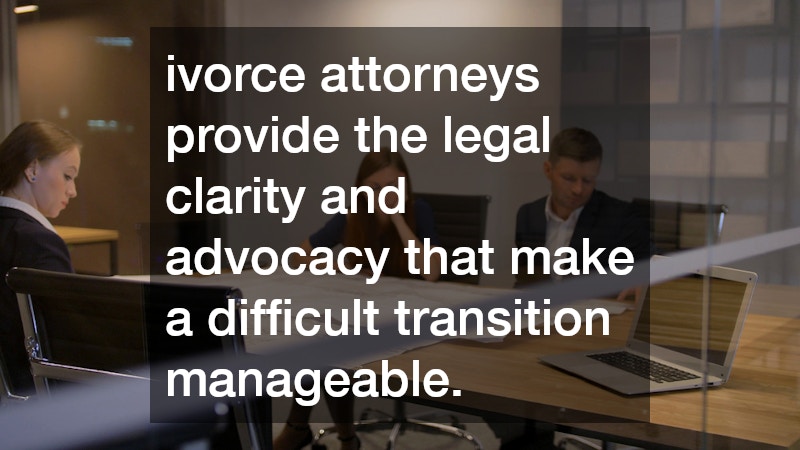Facing the end of a marriage often feels like stepping into unfamiliar territory—emotionally draining and legally complex all at once. That’s why many people turn to experienced legal help early in the process. Divorce attorneys play a central role in translating the confusing legal system into a clear path forward, protecting rights, and helping clients make decisions that affect their financial stability and family relationships for years to come. This article explains, in practical terms, what they do and why hiring the right legal professional can be one of the smartest moves during a divorce.
Handling the Paperwork and Procedural Maze
A divorce involves far more than signing a few forms. Each jurisdiction has precise filing requirements, statutes of limitation, waiting periods, discovery rules, and disclosure obligations.
Missing a single deadline or filing an incorrect form can delay the process or weaken your position. A competent lawyer will:
-
Identify which forms and motions apply to your situation and file them correctly and on time.
-
Prepare and respond to discovery requests (financial disclosures, subpoenas, interrogatories).
-
Ensure enforcement of temporary orders (for child support, spousal support, or exclusive use of a home).
-
Keep the case moving strategically—filing or opposing motions when it benefits your objectives.
By treating the procedural side as a roadmap rather than an obstacle, a lawyer reduces procedural risk and preserves your options for negotiation or litigation.
Protecting Financial Interests and Dividing Assets
Money and property disputes are among the most consequential and contested elements of divorce. Assets can be complex—retirement accounts, business interests, real estate, investment portfolios, and inheritances often require valuation and careful allocation. A skilled legal advisor will:
-
Identify all marital and separate assets, including hidden or undervalued property.
-
Arrange expert valuation where needed (for businesses, pensions, or professional practices).
-
Structure settlements that minimize tax consequences and preserve future income potential.
-
Negotiate settlements that consider both short-term needs and long-term financial security, including retirement planning and debt allocation.
This financial stewardship prevents impulsive decisions that could harm your economic future and helps create a settlement that’s fair and sustainable.
Advocating for Children: Custody, Parenting Plans, and Support
When children are involved, decisions extend beyond asset division to ongoing responsibilities and routines. The stakes feel personal—and rightly so. Legal representation helps translate parenting goals into enforceable agreements by:
-
Crafting parenting plans that balance stability for the children with parental access and flexibility.
-
Representing you in mediation or court on custody disputes and relocation requests.
-
Ensuring child support calculations reflect local guidelines and actual expenses like daycare, medical care, and extraordinary educational costs.
-
Helping modify orders later if circumstances change (relocation, job loss, or new family dynamics).
A lawyer’s experience with family courts and local judges can make custody negotiations more predictable and focused on the children’s best interests rather than emotional retribution.
Managing Conflict, Negotiation, and When Court Is Necessary
Not every divorce goes to trial, and many can be resolved through negotiation or alternative dispute resolution. A good legal representative wears two hats: negotiator and, if necessary, litigator. They will:
-
Evaluate whether settlement via mediation, collaborative law, or direct negotiation better serves your goals.
-
Develop negotiation strategies based on facts, legal precedent, and an understanding of the other side’s likely position.
-
Prepare you for court by assembling evidence, witness testimony, and legal arguments when settlement is impossible.
-
Protect you from common negotiation pitfalls—unfavorable trade-offs, emotional concessions, and rushed agreements.
The right attorney knows when persistence at the bargaining table will yield value and when a firm courtroom stance is required to secure a fair outcome.
Divorce touches nearly every part of life—financial security, parenting, emotional well-being, and future planning. While some cases with minimal assets and total agreement might proceed smoothly without legal counsel, most people benefit from professional guidance to avoid costly mistakes and secure a fair settlement. Experienced legal counsel interprets the law, safeguards financial and parental interests, steers negotiations toward enforceable outcomes, and takes decisive action in court if needed. For those reasons, many people find that engaging qualified legal help is not just a convenience—it’s a critical investment in the stability of their future. If you’re weighing options, consult with local family law professionals to understand how the process applies to your situation and what steps will best protect your interests. Divorce attorneys provide the legal clarity and advocacy that make a difficult transition manageable—and they can be a steady, practical resource when you need one most.




